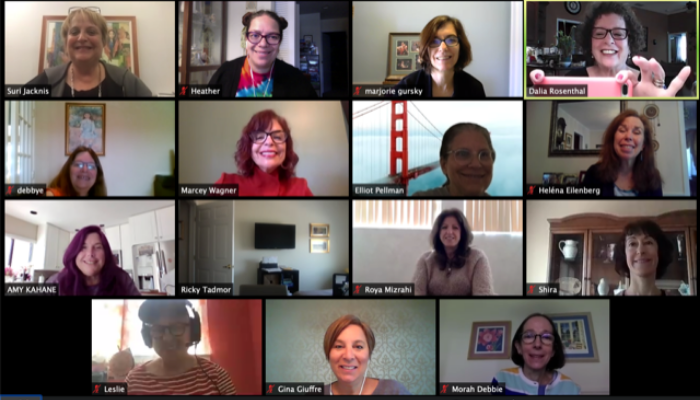How Professional Learning Networks Are Helping Educators Get Through Coronavirus

“I look forward to network meetings more than ever during these uncertain times as the only place I can truly take a break from the rapid pace of my work with teachers, lay leaders, parents and students to simply breathe and be with my colleagues.”
Network Participant 1
“My network is a place I can vent to my colleagues, get ideas, get recharged, and find out what people are doing about various things and how they are planning forward.”
Network Participant 2
“Network meetings are the best part of my week.”
Network participant 3
Comments like these have echoed throughout The Jewish Education Project’s 35 educator networks since the start of life under quarantine nearly two months ago. Simply put, colleagues now need each other more than ever to help navigate the many challenges of these times. Networks provide a place to test out ideas, share methods and discuss what is working and what is not. Each week different questions have surfaced during network meetings. Educators reflect on the complexity of teaching and learning online, and the challenge of keeping students and parents engaged for the short and long term. Together, network members are figuring out how to confront staffing challenges. Everyone is figuring out how to close this school year in a meaningful way. On top of all of these coronavirus-related layers of work, network members must also proceed with normal processes such as registration for the 2020-2021 school year, budgeting, and planning for the year ahead.
It has been very heart-warming to notice how network members have been especially generous to each other. Without hesitation, network members have shared curricular materials they are developing. If someone needs a sample of a letter to parents, five minutes later a network member will email out a letter they shared with their community. In my decades of facilitating educator networks, I have never seen such empathy, genuine collaboration and collegial spirit. As members feel the pressure for a rapid response, members rely on each other.
We were lucky to have already convened many network meetings online so that the transition to exclusively digital gatherings was smooth. Facilitators were already familiar with Zoom and skilled at engaging participants online. To keep pace with the evolving situation, many networks have made the decision to meet much more often. Some now meet weekly, while others meet biweekly. We adjusted the content of our meetings to include a check in with each other in terms of health and personal well-being. Sometimes we engage in a mindfulness exercise or do some movement or other activity to relieve stress, reminding ourselves of the importance of self-care. We share the wisdom we are acquiring from living through these times as we support each other in planning forward at a time of uncertainty. Some networks also return to regular network learning to reintroduce routines as we adjust to our current reality.
Other aspects of The Jewish Education Project’s network culture are deepening. We are welcoming new people into our networks, which rarely happens this late in the academic year. Coronavirus is pushing educators to seek new solutions from colleagues through vehicles like educator networks. People who may not have been active network participants are increasing their involvement. In this time of confusion and uncertainty, network members whose participation may have ebbed are returning to trusted sources like our educator networks. (If you would like to join a network or become re-engaged with a network, please email me or your network facilitator.)
The number one outcome of all of our networks has been to build relationships between and among Jewish educators in metro New York and throughout the country. This has been axiomatic since the early days of network building. Network facilitators have invested countless hours and used multiple strategies to foster these relationships. Together with network participants they have built this precious web of relationships that were in place long before coronavirus. In these challenging times, leveraging these trusting circles of colleagues to provide virtual places of support, caring and inspiration is helping all of us to learn, stay positive, and grow together toward a new normal.
Suri Jacknis is the Director of Educator Networks for The Jewish Education Project. If you would like more information about The Jewish Education Project’s 35 educator networks or would like to join a network, contact her at sjacknis@thejewishedproject.org.
Pictured above: A screenshot from the Long Island Family Learning Network, facilitated by Suri Jacknis.

